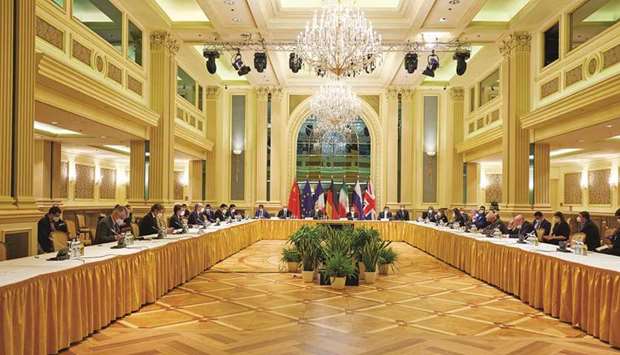The EU, Russia and Iran hailed progress at nuclear talks yesterday as discussions resumed in Vienna following an attack on one of Tehran’s nuclear sites.
The talks also took place just a day after Iran said it had started producing uranium at 60% purity following an explosion at its Natanz nuclear facility that it blamed on arch-foe Israel.
Israel has not formally commented on the incident.
Iran had warned that it would sharply ramp up its enrichment of uranium earlier this week.
That cast a shadow over the talks in Vienna aimed at rescuing a nuclear agreement between Iran and world powers that the United States ditched almost three years ago.
European Union envoy Enrique Mora said yesterday that “progress has been made in a far from easy task. We need now more detailed work”.
Russian ambassador to Austria, Mikhail Ulyanov, added that “participants took note with satisfaction of the progress made so far and expressed determination to continue negotiations with a view to complete the process successfully as soon as possible”.
The discussions involved EU officials and representatives from Britain, China, France, Germany, Russia, and Iran.
China’s envoy to the talks earlier said all participants had agreed to accelerate work on issues including which sanctions the United States would lift.
“All parties have agreed to further pick up their pace in subsequent days by engaging (in) more extensive, substantive work on sanctions-lifting as well as other relevant issues,” Wang Qun told reporters.
Iran delegation head Abbas Araqchi remarked on Telegram that “a good discussion took place within the joint commission”.
“It appears that a new agreement is taking shape and there is now a common final goal among all,” he added.
While noting that all sides appeared to agree on which path to take, Araqchi cautioned that “this will not be an easy path”.
“It is not as if disagreements have been resolved,” he said. “There are still serious disagreements that must be reduced during future negotiations.”
On Friday, Ali Akbar Salehi, head of the Atomic Energy Organisation of Iran, confirmed that Iran was now producing uranium enriched to 60% purity, taking the country closer to the 90% level required for use in a nuclear weapon.
“The enrichment of uranium to 60% is underway” in Natanz, he was quoted by Tasnim news agency as saying.
US President Joe Biden commented that the Iranian decision would not help resolve the stand-off, but added: “We are nonetheless pleased that Iran has continued to agree to engage in discussions.”
Iran has repeatedly insisted that it is not seeking atomic weapons, but it has gradually rolled back its nuclear commitments since 2019, the year after the US under Donald Trump withdrew from the accord and began imposing sanctions.
The 2015 deal, known formally as the Joint Comprehensive Plan of Action (JCPOA), gave Iran relief from sanctions in return for curbs on its nuclear programme.
Iran had committed to keep enrichment to 3.67%, a level it raised to 20% in January.
Negotiations aimed at ensuring the return of the United States to the JCPOA and the lifting of sanctions resumed this week.
“We think that negotiations have reached a stage that the parties can start working on a joint text. The writing of the text can start, at least in the fields with a consensus,” Araqchi said.
China’s representative to the talks, Wang, the only envoy who regularly speaks to reporters outside the talks, said remaining parties to the deal had resumed “productive and constructive work” over the past two days.
“In the next few days we hope the Joint Commission will immediately start negotiating the specific formula of sanction-lifting,” he added, using the term for formal meetings of those parties.

European External Action Service (EEAS) Deputy Secretary-General Enrique Mora and Iranian Deputy at Ministry of Foreign Affairs Abbas Araqchi are seen waiting with other participants for the start of a meeting of the JCPOA in Vienna.
